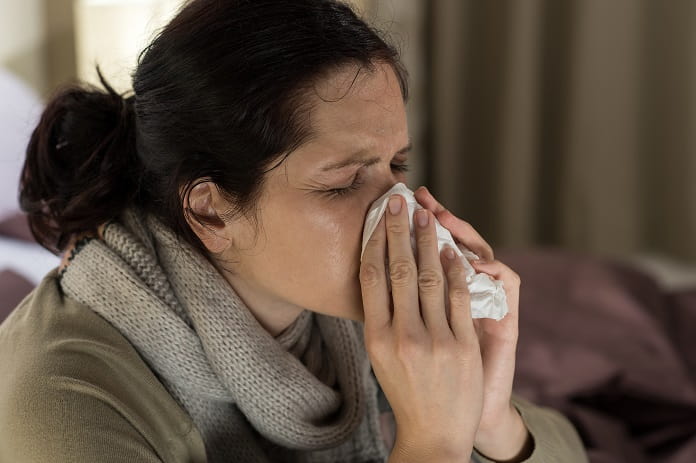Colds are illnesses that affect the upper respiratory tract and are caused by different strains of viruses, most commonly rhinovirus.
Colds are common because there are many strains and no approved antiviral treatment.1 However, some remedies can help relieve the symptoms and at times, decrease the duration of the disease. This article will cover some of the natural remedies for common cold.
How to prevent colds
We can help prevent colds by boosting our immune systems. Eating a healthy diet rich in fruits and vegetables, sleeping well and exercising regularly are all great habits that can keep your body healthy and decrease the likelihood of getting sick. In addition, the American academy of family physicians recommends practising good hygiene by washing hands regularly with soap and water for 15-30 seconds or using hand sanitizer when water isn’t available to prevent colds and other infections.2
Natural remedies for common cold
Colds are “self-limited infections”, which means that the body usually fights them off without medications. A common cold usually resolves within 10 days in a healthy adult.2 When you have a cold, your body works hard to recover. You can help your body by resting, sleeping well and drinking ample fluids to help prevent dehydration. You can also try these home remedies to relieve the symptoms of a cold.
Steam, salt water gargles, and nasal irrigation
Warm water and salt can help clear both nose and throat. A 2015 Cochrane review gathered the data from five studies on the effect of saline drops on upper respiratory tract infections.1 Most studies were small, so despite the possible benefits, the researchers did not make a recommendation for saline drops to be used as standard care.
Nasal irrigation is commonly used to clear nasal passages and relieve a stuffy nose. A small pilot randomized controlled trial3 compared salt water gargling and saline drops to standard care in 66 participants. In the participants who took part in hypertonic saline irrigation and gargling, the duration of illness was lower by 1.9 days (p = 0.01) and over-the-counter medications use decreased by 36%. However, a larger trial is needed to confirm their results.
On the other hand, steam wasn’t found to help treat upper respiratory tract infections based on a Cochrane review.2
Food and herbs
Although foods and herbs are natural products, they may still have side effects. Honey is the only established effective food for treatment of colds that is safe in young children (older than one year). In addition, eating honey before bedtime may decrease the severity of cough.2
Garlic and garlic supplements are commonly used for treatment of colds, but there is insufficient evidence on their benefit.4
Herbs like menthol are safe in children two years and older. Menthol, eucalyptus and camphor may be used in the form of an ointment that is rubbed on the chest and neck and can help relieve symptoms of nasal congestion and cough and assist sleep.2 Some herbs like Ginseng and Echinacea are used as cold remedies, but they have no or limited effectiveness for the treatment of common cold based on a Cochrane review.2
Vitamins and minerals supplements
Vitamin C is famously used as a preventive measure for cold, but evidence on its effectiveness is lacking especially after symptoms have already appeared, as it does not affect the duration or severity of symptoms.2 However, based on a Cochrane review of 29 trials, Vitamin C reduced symptom duration by 18% in children but more randomized controlled trials are needed. Vitamin D wasn’t found to improve symptoms of cold, and vitamin E was actually found to worsen symptoms in a study done on older adults.2
Several studies show that zinc supplements can relieve cough and nasal discharge faster when treatment is started within 24 hours of symptom onset.2A meta-analysis of seven randomized trials on the efficacy of zinc lozenges had promising results. The mean duration for common colds was 33% shorter for the zinc groups of the seven included trials.5
There is a lot of mixed advice about the effectiveness natural remedies for common cold. The results of clinical research suggest that nasal irrigation using warm water and salt may help relieve symptoms and honey may be effective for relief of cough in adults and children older than one year. Studies suggest that herb ointments containing menthol or camphor can also improve symptoms and improve sleep. But remember, staying healthy and maintaining good hand hygiene are the most effective preventive measures.
References
1. King D, Mitchell B, Williams CP, Spurling GK. Saline nasal irrigation for acute upper respiratory tract infections. Cochrane Database Syst Rev. 2015;(4). doi:10.1002/14651858.CD006821.pub3
2. DeGeorge KC, Ring DJ, Dalrymple SN. Treatment of the Common Cold. Vol 100.; 2019. www.aafp.org/afp. Accessed October 16, 2020.
3. Ramalingam S, Graham C, Dove J, Morrice L, Sheikh A. A pilot, open labelled, randomised controlled trial of hypertonic saline nasal irrigation and gargling for the common cold. Sci Rep. 2019;9(1):1-11. doi:10.1038/s41598-018-37703-3
4. Lissiman E, Bhasale AL, Cohen M. Garlic for the common cold. Cochrane Database Syst Rev. 2014;2014(11). doi:10.1002/14651858.CD006206.pub4
5. Hemilä H. Zinc lozenges and the common cold: a meta-analysis comparing zinc acetate and zinc gluconate, and the role of zinc dosage. JRSM Open. 2017;8(5):205427041769429. doi:10.1177/2054270417694291



